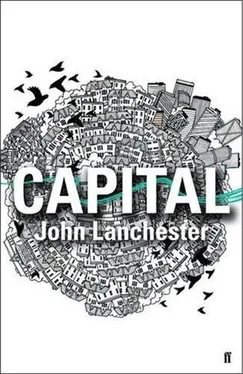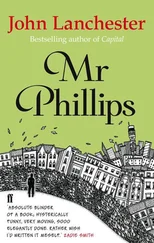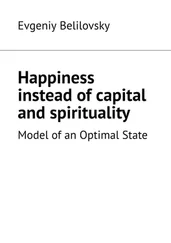This caused a strange reversal. For most of its history, the street was lived in by more or less the kind of people it was built for: the aspiring not-too-well-off. They were happy to live there, and living there was part of a busy and determined attempt to do better, to make a good life for themselves and their families. But the houses were the backdrop to their lives: they were an important part of life but they were a set where events took place, rather than the principal characters. Now, however, the houses had become so valuable to people who already lived in them, and so expensive for people who had recently moved into them, that they had become central actors in their own right.
This happened at first slowly, gradually, as average prices crept up through the lower hundred thousands, and then, as people from the financial industry discovered the area, and house prices in general began to rise sharply, and people began to be paid huge bonuses, bonuses that were three or four times their notional annual pay, bonuses which were big multiples of the national average salary, and a general climate of hysteria affected everything to do with house prices – then, suddenly, prices began to go up so quickly that it was as if they had a will of their own. There was a sentence that rang down the decades, a very English sentence: ‘Did you hear what they got for the house down the road?’ Once, the amazingly big figure under discussion involved sums which just crept into the ten thousands. Then they were in the multiples of ten thousand. Then they were in the low hundred thousands, and then in the high hundred thousands, and now they were in seven figures. It began to be all right for people to talk about house prices all the time; the topic came up in conversation within the first minutes of people speaking to each other. When people met they held off the subject of house prices with a conscious sense of restraint, and gave in to the desire to talk about them with relief.
It was like Texas during the oil rush, except that instead of sticking a hole in the ground to make fossil fuel shoot up from it, all people had to do was sit there and imagine the cash value of their homes rattling upwards so fast that they couldn’t see the figures go round. Once the parents had gone off to work and the children off to school you saw fewer people in the street in the daytime, except builders; but the houses had things brought to them all day. As the houses had got more expensive, it was as if they had come alive, and had wishes and needs of their own. Vans from Berry Brothers and Rudd brought wine; there were two or three different vans of dog-walkers; there were florists, Amazon parcels, personal trainers, cleaners, plumbers, yoga teachers, and all day long, all of them going up to the houses like supplicants and then being swallowed up by them. There was laundry, there was dry-cleaning, there were FedEx and UPS, there were dog beds, printer ribbons, garden chairs, vintage film posters, same-day DVD purchases, eBay coups, eBay whims and impulse buys, mail-order bicycles. People came to the houses to beg and to sell things (towels for the homeless, utility company salesmen). The tradesmen and trainers and craftsmen disappeared into the buildings and came out when they were finished. The houses were now like people, and rich people at that, imperious, with needs of their own that they were not shy about having serviced. There were builders in the street, all the time, servicing the houses, doing up lofts and kitchens and knocking though and adding on, and there was always at least one skip parked in the street, and at least one set of scaffolding. The new craze was for doing up basements and turning them into rooms – kitchens, playrooms, utility rooms – and the houses going in for this craze had conveyors of dirt flowing into skips. Because the earth was compressed by the weight of the houses above it, as it was dug up it expanded to five or six times its original size, so there was something bizarre, even sinister, about this digging, as if the earth was spreading, vomiting, rejecting its own excavation, and far far too much of it seemed to come out of the ground, as if it were fundamentally unnatural to reach down into the earth to take up more space, and the digging could go on for ever.
Having a house in Pepys Road was like being in a casino in which you were guaranteed to be a winner. If you already lived there, you were rich. If you wanted to move there, you had to be rich. It was the first time in history this had ever been true. Britain had become a country of winners and losers, and all the people in the street, just by living there, had won. And the young man on the summer morning moved along the road, filming this street full of winners.
December 2007
On a rainy morning in early December, an 82-year-old woman sat in her front room at 42 Pepys Road, looking out at the street through a lace curtain. Her name was Petunia Howe and she was waiting for a Tesco delivery van.
Petunia was the oldest person living in Pepys Road, and the last person to have been born in the street and still be resident there. But her connection with the place went back further than that, because her grandfather had bought their house ‘off the plan’, before it was even built. He was a barrister’s clerk who worked at a set of chambers in Lincoln’s Inn, a man who was both conservative and Conservative, and in the way of barristers’ clerks he passed on the job to his son, and then, when his son had only daughters, to his grandson-in-law. That was Petunia’s husband, Albert, who had died five years before.
Petunia did not think of herself as someone who had ‘seen it all’. She thought she had had a narrow and uneventful life. Nonetheless, she had lived through two-thirds of the whole history of Pepys Road, and she had seen a great deal, noticing more than she ever admitted and judging as little as she could. Her feeling on this point was that Albert had done enough judging for both of them. The only gap in her experience of Pepys Road was when she was evacuated during the early years of the Second World War, spending 1940 to 1942 at a farm in Suffolk. That was a time she still preferred not to think about, not because anybody was cruel to her – the farmer and his wife were as nice as they could be, as nice as the constant labour of their physically active lives allowed them to be – but simply because she missed her parents and their cosy, familiar life, with the day shaped by her father’s arrival home from work and the tea they took together at six o’clock. The irony was that despite being evacuated to miss the bombing, she had been there the night in 1944 when a V-2 rocket landed ten doors down the street. It had been four o’clock in the morning, and Petunia could still remember how the explosion had been a physical sensation rather than a noise – it pushed her firmly out of bed, like a companion who had got tired of sleeping with her but wished her no harm. Ten people died that night. The funeral, held at the big church on the Common, had been awful. It was better to have funerals on rainy days, with no sky, but that day had been bright and clear and crisp and Petunia hadn’t been able to stop thinking about it for months.
A van came along the road, slowed and stopped outside. The diesel engine was so loud that the windows rattled. Perhaps this was it? No, the van re-engaged its gears and moved off down the street, making an up-down banging as it went over the sleeping policemen. They had been supposed to reduce the amount of traffic in the street but seemed only to have made it more noisy, and also more polluted, as traffic slowed to go over the bumps and then accelerated away afterwards. Since they were put in there had not been a single day on which Albert did not complain about them: literally not a single one from the day the road reopened to traffic until his sudden death.
Читать дальше












